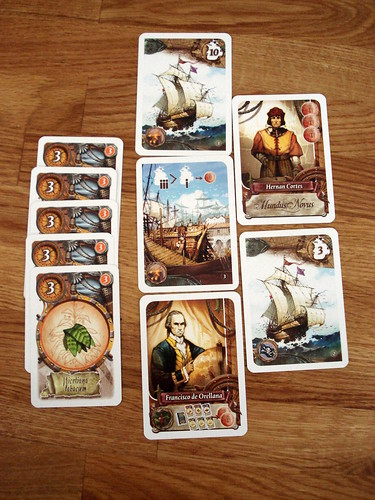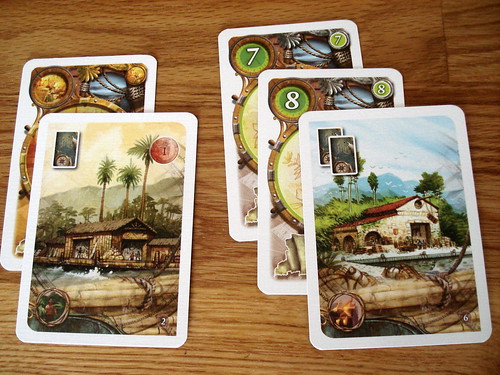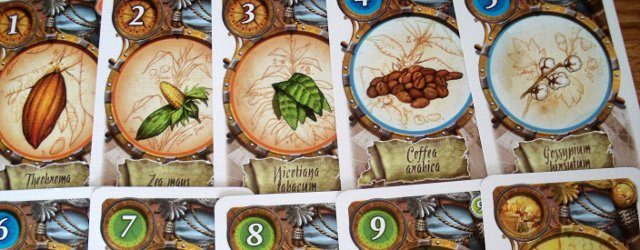| Strategy | Luck |
|---|---|
| Interaction | Components & Design |
| Complexity | Score |
Mundus Novus is another game we took home from Essen last year. We just couldn’t find a reason not to, everything about it just sounded right. The trade with the new world theme is always popular with me, implementing it as a light card game instead of a strategy-heavy trading game made it even more attractive – we had a bunch of those in our bags already. On top of that, the package is attractive – the insides keep the package’s promise, by the way – and it proclaims Serge Laget and Bruno Cathala as the authors, another definite point in the games favour. And so home with us it went.

Just how many is decided by the current Trade Master. He decides the number of cards to trade that every player has to lay out on the table now. Trading in Mundus Novus is a bit more elaborate than usual for a game this light, maybe a bit more elaborate than it needs to be. First, the player that put the highest total value of goods on the table becomes the new Trade Master. He then starts his term of office by picking one of the cards the others put down and either taking it directly to his hand or switching it with one of the three cards of the market and taking that one. The player he just took a card from now does the same and so on, taking care not to switch back and forth between the same two players. If the last remaining card is taken from the Trade Master, then everything is fine and all players have the same number of cards as before. Otherwise, the Trade Master has to give one of his hand cards to that last player in order to even the numbers. And that still doesn’t cover all the cases: one player may be left with card when all the others have run out. That player simply takes his remaining cards back – he might not even be to unhappy about that. These special cases at the end make the whole trading a bit wrinkly, and even after a few games you still have to think who has to give a card to whom at then end.
A this point you hopefully have one or two sets of cards in your hand, either three or more of the same kind of goods or a straight of at least four cards. Incan Gold can be used as a wildcard here. The two kinds of sets have very different benefits for you, but you can only trade in one of each per round, so your options for strategic planning are limited. Straights can be traded in for dubloons, the victory points of Mundus Novus. Being a few coins closer to winning is nice, but it’s not very interesting. For interesting you trade in sets of the same value, they buy you Progress cards. Progress cards are the most interesting part of Mundus Novus, they give you exactly what it says on the tin: progress. They make the next round play differently from the previous one. The most common Progress Cards are the caravels from two paragraphs up, allowing you to get more cards, and warehouses that let you keep cards at the end of the turn instead of discarding all leftovers. There are merchants in the progress deck that trade one type of commodity into another, and to round off the selection historic personalities from Ponce de Léon to Hernan Cortes grant you a variety of more powerful abilities. You probably don’t expect to be able to pick from all of those cards, and you’re right: depending on the number of cards in your set and their value, you have one, three of five cards to pick from. To spice things up a little more and make one round feel less like the other, five different events can occur. Storms and Indigenous People reduce your choice in Progress Cards and your profit in dubloons, respectively, for example.

Even with one player collecting more dubloons than everyone else from the beginning, victory is open until the end because there are two ways of winning. One of them is to have the most dubloons at the end of the game, the other is to discard the perfect combination – a straight from one to nine, with some Incan Gold to top it off. That way of winning is a bit harder to pull off as you do need some luck with the cards, but it does have an advantage: you can concentrate on Progress Cards from the beginning. When trying for the money, on the other hand, you can’t just sell everything, you still need some Progress or you will just take too long. Whichever way you decide for, you will want two or three caravels to have enough cards to fuel your economy. But once you have those caravels, which path you chose won’t make a huge difference for your strategy. You can only sell one set and only buy one progress card per round anyway, so your choices here are limited. The only change you might make one way or the other is which Progress Card you chose.
And there’s the problem I see with Mundus Novus: you will make similar decisions from round to round and from game to game. Despite the events, all rounds feel similar. The only real change is in the progress cards, but there is just too much around them that feels unchanging – especially the trading is very time-consuming for the effect on the game it has. I still enjoy Mundus Novus, and I don’t want to make it sound too bland. There are enough different Progress Cards that they will influence your strategy and make not all games quite the same. But there is not enough difference to play it many times, and the longest part of the game – the trading – has too little impact on the outcome.








